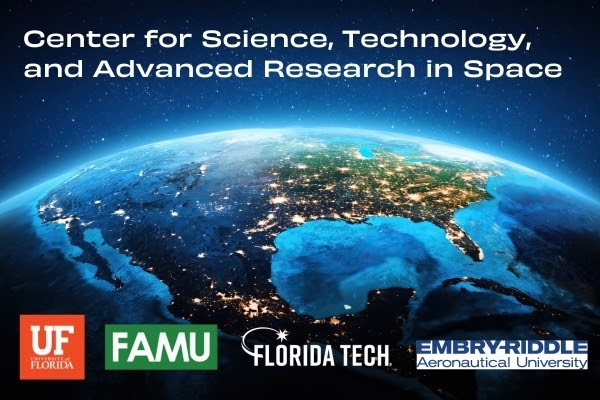Florida universities launch space manufacturing effort, C-STARS
University of Florida (UF) Health News
By Matt Splett
Gainesville, Florida — In an ambitious move to support the rapidly expanding space manufacturing sector, four Florida universities have joined forces to establish the Center for Science, Technology, and Advanced Research in Space, or C-STARS.
Researchers from the University of Florida, Florida A&M University, Embry-Riddle Aeronautical University, and Florida Institute of Technology will collaborate with industry partners to advance the production of unique medicines, electronics, and bioenergy systems in space. Additionally, these universities will collaborate with Tennessee-based Oak Ridge Associated Universities to enhance outreach strategies. The multisite center will lead workforce development programs to train the next generation of specialists in space technologies, sciences, and exploration.
The rapid increase in private sector investment and competition has increased the demand for in-space manufacturing technology and products to drive the new space economy. C-STARS brings together space research and manufacturing experts to fulfill the demand for space-related data, products, and services.
“Space manufacturing provides distinct advantages that cannot be replicated on Earth, enabling the production of novel and potentially higher-quality products,” said Siobhan Malany, Ph.D., an associate professor of pharmacodynamics in the UF College of Pharmacy and center director of C-STARS. “As space research becomes more accessible and affordable, commercial space companies will depend upon C-STARS’ expertise to develop the necessary infrastructure and train their workforce to grow their space operations.”
C-STARS will serve as a key hub for collaborations between researchers and commercial companies within the nation’s epicenter of space activity. Florida is home to more than 17,000 space-related companies contributing billions in revenue to the state’s economy. Nearly 70% of all the U.S. orbital launches occurred at Kennedy Space Center and Cape Canaveral last year, making it the nation’s busiest spaceport.
More than 50 aerospace, government, and industry partners have expressed interest in collaborating with C-STARS. These industry partners are eager to work with the center’s leadership team to address space manufacturing challenges and develop solutions.
“C-STARS will enable companies to capitalize on this emerging market, helping them create or expand their space portfolios and grow their industry,” said Jamie Foster, Ph.D., a professor in the Department of Microbiology and Cell Science at UF/IFAS and the principal investigator for UF’s C-STARS site. “New commercial space stations are in development that will enable new platforms and transportation mechanisms for those companies looking to expand their space portfolios. It’s exciting that C-STARS will serve as the nucleus for growing this part of the space economy.”
The four universities comprising C-STARS have identified six research areas where they have intersecting experience and expertise. UF is expected to lead the way in health science research, including bioprinting, tissue engineering, and disease modeling, and provide expertise in bioenergy systems and artificial intelligence. The universities will also develop new corporate mentoring programs, curricula, certifications, and internship programs to train the future workforce in this dynamic and rapidly changing field.
The concept of C-STARS inspired Malany to launch the In-Space Biomanufacturing for Human Health Innovation Hub backed by UF President Ben Sasse’s strategic funding initiative. The hub synergizes research across multiple colleges to investigate the significant effects of space conditions on cell-based products and bioproducts used for preclinical research.
“C-STARS leverages expertise from many areas of the university, and our proximity to the Kennedy Space Center, to the benefit of the many current and future space entities, public and private, who want to get their technologies to low Earth orbit and beyond,” said Rob Ferl, Ph.D., assistant vice president for UF Research and director of the Astraeus Space Institute, which brings together more than 100 faculty members from across UF to collaborate on space-related research.
C-STARS’ first year of planning is backed by a $80,000 Industry-University Cooperative Research Centers Program grant from the National Science Foundation. This grant will support the development of essential research and training programs and set the stage for future projects.
